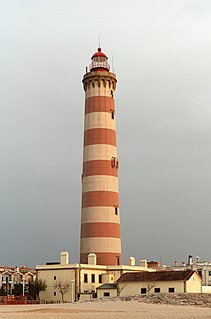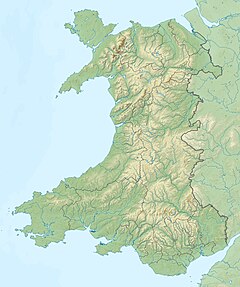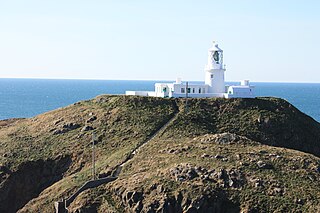
Strumble Head Lighthouse stands on Ynys Meicel, also known as Strumble Head, a rocky island at the northwest corner of Pencaer area, five miles west of the town of Fishguard, in northern Pembrokeshire, Wales.

Mumbles Lighthouse, completed in 1794, is a lighthouse located in Mumbles, near Swansea. The structure, which sits on the outer of two islands off Mumbles Head, is clearly visible from any point along the five mile sweep of Swansea Bay. Along with the nearby lifeboat station, it is the most photographed landmark in the village.

The South Bishop Lighthouse is a lighthouse on South Bishop Island, a small rock approximately 5 miles (8 km) west of St Davids Head in Pembrokeshire, Wales.

Smalls Lighthouse stands on the largest of a group of wave-washed basalt and dolerite rocks known as The Smalls approximately 20 miles (32 km) west of Marloes Peninsula in Pembrokeshire, Wales, and 8 miles (13 km) west of Grassholm. It was erected in 1861 by engineer James Douglass to replace a previous lighthouse which had been erected in 1776 on the same rock. It is the most remote lighthouse operated by Trinity House.

Caldey Lighthouse is located on the south end of Caldey Island, three miles off the south Pembrokeshire, Wales coastline, a small island inhabited by a Cistercian monastery.
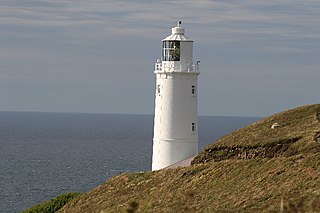
Trevose Head Lighthouse is a lighthouse on Trevose Head on the north Cornish coast at grid reference SW850766 lying to the WSW of Padstow and was sited here as there was previously no light from Land's End to Lundy and would be visible from Cape Cornwall to Hartland Point.

St Anthony's Lighthouse is the lighthouse at St Anthony Head, on the eastern side of the entrance to Falmouth harbour, Cornwall, UK. The harbour is also known as Carrick Roads and is one of the largest natural harbours in the world.

Nash Point is a headland and beach in the Monknash Coast of the Vale of Glamorgan in south Wales, about a mile from Marcross. It is a popular location for ramblers and hiking along the cliffs to Llantwit Major beach. The lighthouse meadow is a Site of Special Scientific Interest, containing rare plants such as the tuberous thistle, and other wildlife such as choughs can be seen.
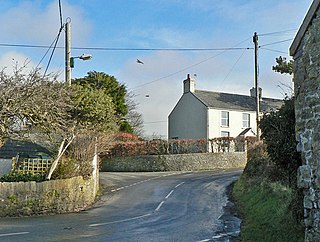
Marcross is a small village in the rural community of St Donats in the Vale of Glamorgan, south Wales. It consists of a public house and a few scattered houses, farms, and a small medieval church in the centre of the village.

St Bees Lighthouse is a lighthouse located on St Bees Head near the village of St Bees in Cumbria, England.
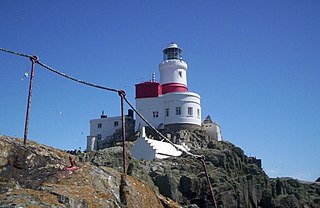
The Skerries Lighthouse was first lit on the highest point of the largest island in The Skerries, Isle of Anglesey after 1716. A patent for the lighthouse was subsequently obtained in 1824. The builder was William Trench, who lost his son off the rocks and died in debt in 1725. He is said to have originally been allowed a pension from the Post Office, rather than payment from shipping tolls. An act of 1730 allowed his son-in-law, Sutton Morgan, to increase the dues charged for shipping and confirmed the patent on the light to Morgan's heirs forever.

The West Blockhouse Point Beacons are three leading light beacons, they perform the same function as a lighthouse and are situated on the promontory to the west side of the entrance to Milford Haven, and lie about a mile north-east of St. Ann’s Head in Pembrokeshire, Wales. They consist of three octagonal reinforced-concrete towers of 30 feet (9.1 m), 37 feet (11 m) and 46 feet (14 m) in height, with sides 1.5 feet (0.46 m) in width, surmounted by cantilevered octagonal concrete platforms on which stand sealed-beam lights. The lights are accessed by ladders which extend up the columns through an opening in the platform. Each column carries a steel daymark painted black and white.

The South Stack Lighthouse is built on the summit of a small island off the north-west coast of Holy Island, Anglesey, Wales. It was built in 1809 to warn ships of the dangerous rocks below.
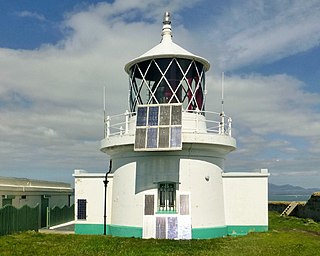
St Tudwal's Lighthouse on Saint Tudwal's Island West is active, but unstaffed. The site of the lighthouse, which marks the north end of Cardigan Bay, was purchased by Trinity House in 1876 at the sum of £111 and the next year the stone building was complete. It is 10.7 metres (35 ft) tall, with its focal plane at 46 metres (151 ft). The main white light has a range of 14 nautical miles and its red sector light has a shorter range of 10 nautical miles. It gives 1 white and red flash every 15 seconds, the intensity being 12,000 candelas.
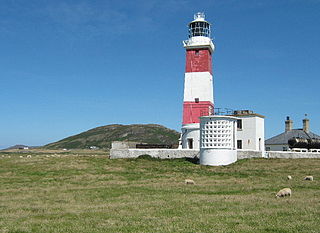
Bardsey Lighthouse stands on the southerly tip of Bardsey Island, off the Llŷn Peninsula in Gwynedd, Wales, and guides vessels passing through St George's Channel and the Irish Sea.

Peninnis Lighthouse is situated on Peninnis Head, St Mary's, Isles of Scilly.
